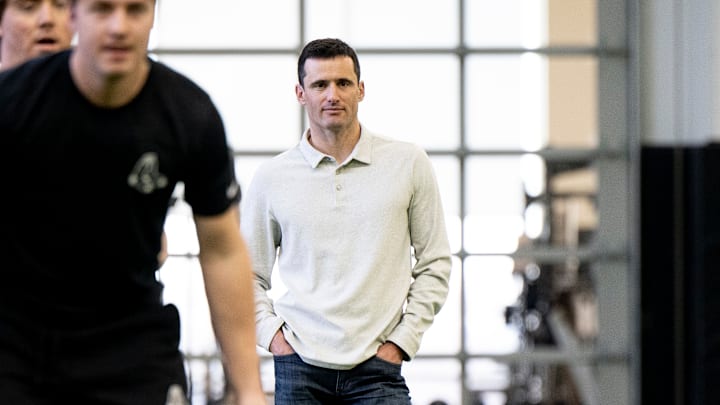Shake-ups have begun within the ranks of the Washington Nationals front office.
Less than three weeks after the team hired away then-Red Sox assistant general manager Paul Toboni to lead the Nationals into the future, Toboni's gone straight to work making his mark on the organization. A new report from Spencer Nusbaum and Andrew Golden of the Washington Post signals that the new Toboni regime has dismissed numerous members of the organization on the affiliate level, days after a prior report that several assistant general managers were also relieved of their duties.
There's not much that can be done besides trust in Toboni's process. The Nationals, as Nusbaum and Golden put it, aren't used to this kind of rapid, sweeping organizational change. That's in large part, though, due to the fact that they're simply not used to change period--this is the first changing of the guard at the top of the Nationals' front office since Jim Bowden resigned prior to the start of the 2009 season and Mike Rizzo took over the job. It's a needed change, and it's one that somewhat mirrors the approach taken by the division rival Marlins when former Rays general manager Peter Bendix took the helm in Miami.
Toboni's full-scale effort to shape the organization in his vision has revealed some glaring issues with the approach Rizzo took as a general manager. It's well-known that as other successful ballclubs began embracing Statcast data and other analytical advances within data science and the sport as a whole, Rizzo's Nationals lagged behind. The club's development, coaching, and drafting all floundered, digging the team into an impossible-to-escape hole until something changed in the team's organizational philosophy. All this was known, but it's always striking when more information comes out really highlighting the extent to which this was taken place. One example that comes to mind is Rizzo's placement of signs in the bullpen during 2024 Spring Training that read "I don't care how fast you throw ball four," a self-serving, meaningless slogan that truly only served to pinpoint his and the rest of the organization's reductionist approach to coaching and player development.
On Friday, Bennett highlighted another example of poor messaging from the developmental coaching staff formerly hired by Rizzo. Seaver King, the Nationals' first round pick of the 2024 amateur draft, spoke to reporters after a 5-RBI Arizona Fall League performance about his struggles to find consistency at the plate, and was coached by Tigers top prospect Kevin McGonigle (MLB No. 2, Pipeline) to spend less time adjusting his swing and more time focusing on timing up the pitch. The Nationals, as Bennett pointed out, ran the lowest minor league walk rate among all MLB organizations in 2025, and if coaches were spending time constantly trying to tweak players' swings to find some elusive "perfect stroke," King's comments highlight how often Nats farmhands were being left to fend for themselves when it comes to getting into hitters' counts.
The Thursday WaPo report includes another eye-opening tidbit:
"Additionally, in years past, the Nationals put performance analysts — staffers who could translate data and information from the analytics department for players and coaches — in the dugouts at each of their affiliates. Before the 2025 season, though, those analysts were told they should not be there. Early in DeBartolo’s stint as interim GM, though, they returned. Managers were told to use the analysts as they best saw fit." (Nusbaum & Golden)
There is a such thing as micromanagement when it comes to data analysis, but it's been proven time and again that there is almost no drawback to having more information at your disposal. The best and most successful organizations in baseball at developing players discovered this long ago, and to see the Nationals under Mike Rizzo actively taking a step back lends additional credence to the idea that the team was simply spinning its wheels, pointlessly making changes just for the sake of doing something instead of biting the bullet and delving into the root cause of the team's issues.
The beginning of Paul Toboni's tenure as the head of the Washington Nationals' baseball operations may be tumultuous for long-time members of the front office, but brighter days are ahead if the team starts actually emulating the approach other successful teams take to player development and roster construction. All we can truly do is hope, pray, and watch.
